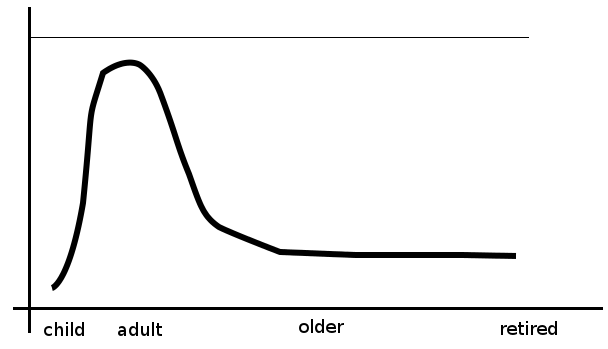Table of Contents
2011.09.30 - education for the next century?
there are a lot of talks about education. ppl noticed that long-known model of teaching, where it was important to have as much knowledge as possible in our minds, does not comply well with current demands. in Poland i am probably part of one of the first generations to confirm this in real life.
don't get me wrong. knowledge is VERY important. the more you know, the more things becomes clear, the more things you can understand, the more you can analyze, wider your horizons are… problem is that nowadays it is not possible to know everything. more over - it is not possible to know even a significant part of what human kind already knows. more over - things changes faster than one can keep a track of. the crucial part of required mind-skills today is ability to adopt to the changing environment, to learn new things, and be able to search for required knowledge when needed… and sometimes also when not - i.e. the fact you know solution for problem currently faced, doesn't mean it's good. how do you know there is no 10x simpler solution for this, that's both fast and robust, waiting out there for you to be “discovered”?
world changes
recently i had few astonishing talks with people from other branches. the observation i made was that most of the people stop their education just after finishing their final school/studies. they go to work and use knowledge they've learned. since practice differ from the theory a lot, usually it requires some practical-tuning for a particular job, so that education de facto last 1-3 years longer. but then it suddenly stops.
i was shocked when i was asked to review a document that contained only space-based indentation, randomly mixed with tabulators. but that's not over. text also was justified with spaces, lines braked manually with enters, and line ended with long word it was manually split into two lines with (manually-inserted) hyphen1). as can be imagined, this document was written by a person used to typewriters, “forced” by the zeitgeist to use computer. few days later i got message that nearly killed me. in building engineering it is common practice to generate list of elements from the CAD designs and then processing it manually (counting instances, adding prices to each, separating them by rooms they'll be needed in, etc…). “good old days”? eeeh - not really. for a few-floor building it requires approximate 3-4 people working full time for about 2-3 months! average-skilled programmer could script/code automate to do the same in 2-3 days. so why there is no such tool? well - people would have to learn new tool, but they do not want to… another thing - a friend of mine got a job at a public school and one of her first assignments was to write some application for a manager. it had to be delivered in two copies. so she took a computer, wrote it in some WYSIWYG, installed there, and printed in two copies. all done - manager was happy. but the same day she was blamed by her coworkers (2 ppl around their 60s) to be lazy! they argued that if she had a will to work hard, she'd do the same as they do for about 40 years now - took a pen and a paper and write two copies by their hand! i'm scarred what would happen if they'd get assignment for preparation year-closing report of ~100 pages for 50 stakeholders. i hope they wouldn't work them selves to death…
IT too
these are of course just examples. there are more similar jokes (though some people tend to call it “work”) i came across recently. but what hit me was the total lack of interest neither in what is going on around them, nor the things that makes their lifes simpler. i thought to myself - “gosh - good that in IT ppl do learn on a daily basis and so we have no such problems”. but wait… don't we? haven't you worked at least once with someone claiming that CVS is the best VCS ever, or that ZIPing their work once a day with a date in the file name is just fine? or maybe “C+” programmer, using C++ compiler as C compiler with randomly added (god-)classes? i bet you did. such a clames are often stated by ppl how have no will of being up to date with the state-of-art (or at least commonly accepted solutions). i was once told i do not understand OOP because i make many small classes, sometimes with as little as 1-3 methods, sometimes no members. when i started explaining, talking about SOLID, Open/closed principle, Dependency injection, Interfaces, single responsibility principle, RAII, etc… i've realized, even though accusers were only ~10 older then me, they have heard this terminology for the first time in their lifes…
the proposal
 and so having all of this in my mind i started to wonder - what is actually going wrong? how should education change to comply with with century's needs? answer came to my mind when i was on my way to DFN lectures on AI we do every year. the problem is not only the content of the educational program, that so many is being talked about these days. the other, maybe even more important one, is the lack of constant learning among the society.
and so having all of this in my mind i started to wonder - what is actually going wrong? how should education change to comply with with century's needs? answer came to my mind when i was on my way to DFN lectures on AI we do every year. the problem is not only the content of the educational program, that so many is being talked about these days. the other, maybe even more important one, is the lack of constant learning among the society.
current system of “learn until 20-25 years old and go to work” worked well in the past, when ppl lived much shorter, world changed MUCH slower, and most of the work was focused on physical strength and manual skills. what is needed now is thinking a lot, knowing much, learning fast and often. physical powers are of less and less usage every day. it is the human mind that needs to be focused on.
to achieve these goals i thought about “blurring” learning and working times so they'd overlap for most of the life time. when ppl get older, their mind capabilities goes down, and so mode has to reflect this as well. so finally we have model, when (assuming 5+2 week model) people interleave work and learning:
- when they are young they spend most of the time learning (say 4-4.5 days), witch just a little work to keep good habits and ensure knowledge is not purely theoretical.
- when they become adults they can make use of their skills more: say 3-4 days at work and remaining is still learning.
- when getting older they can still work 4-4.5 days, while having still some education ongoing to be up to date with the world and ensure their brains are fully operational2).
draft of such a curve can be seen on a picture to the right.
what changes? ppl would need to learn the same way they do now thing,they need to have higher education. this would ensure ones having higher education will be at least up to date with state-of-art technologies, no matter how old they are. i belive that is this would be well implemented in real life cost of education will make a profit, since resources would not be lost because of lack of knowledge or “i do it this way for 40 years boy!” syndrome.

